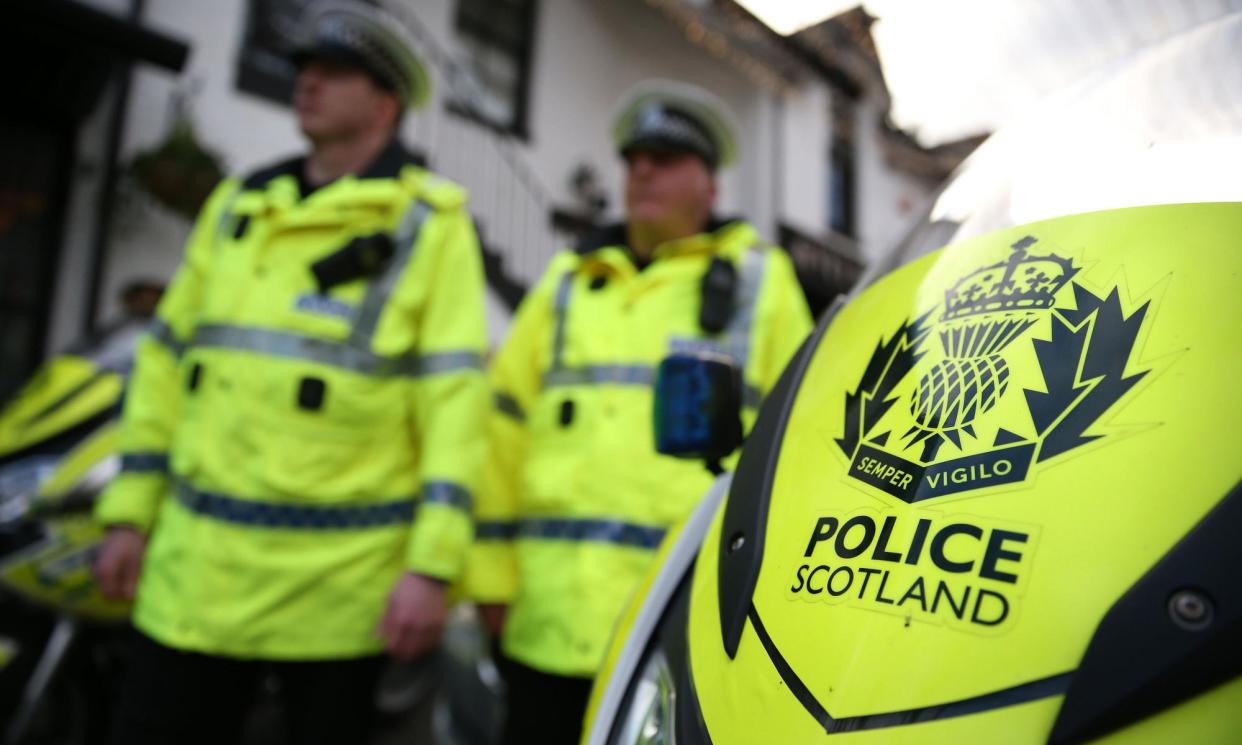Scotland’s first minister defends Hate Crime Act amid barrage of criticism

Scotland’s first minister has described his new hate crime law as “absolutely balanced” on the day the controversial legislation came into force amid a barrage of criticism.
Humza Yousaf’s comments came as David Kennedy, the general secretary of the Scottish Police Federation, said enforcing the Hate Crime and Public Order (Scotland) Act 2021 would reduce public trust in policing and the author JK Rowling, a prominent critic of the legislation, dared the police to arrest her for misgendering.
The Scottish government has consistently said that misgendering a transgender person is not criminalised by the new law.
Yousaf said the legislation, which is intended to consolidate existing hate crime laws, “absolutely protects people in their freedom of expression” while guarding “people from a rising tide of hatred that we’ve seen far too often in our society”.
The act, which was supported by MSPs from Scottish Labour and the Scottish Liberal Democrats as well as the Scottish National party, also creates a new offence of “threatening or abusive behaviour that is intended to stir up hatred” on the grounds of age, disability, religion, sexual orientation, transgender identity and variations in sex characteristics.
The legislation has been criticised for not including sex in the list of protected characteristics, but the Scottish government plans to create a standalone offence to tackle misogynist abuse.
There have been escalating concerns about how the law will be policed and how it could affect freedom of speech, as well as fears that the legislation could be used maliciously against certain groups for expressing their opinions, in particular gender-critical feminists.
But Yousaf said officers had been policing hate offences “very sensibly” for decades, for example the offence of stirring up of racial hatred, which has been in place UK-wide since 1986.
“Unless your behaviour is threatening or abusive and intends to stir up hatred, then you have nothing to worry about in terms of the new offences being created,” he said.
Earlier on Monday, Kennedy told BBC Radio 4’s Today programme that the law, which requires officers to assess “emotive” subjects such as online misgendering, would “cause havoc with trust in police in Scotland” and would “certainly” reduce it.
In common with many critics who have raised concerns about the legislation’s lack of clarity, Kennedy said he thought it would have to be tested in the appeal courts before the “real elements of the act” and how they should be interpreted in law come to fruition.
He added that at a time of diminishing officer numbers, Police Scotland had been allocated no extra money to provide training, and that preparation was limited to a two-hour online module.
Rowling challenged the new law in a lengthy thread on X, saying the legislation was “wide open to abuse” after listing sex offenders who had described themselves as transgender alongside well-known trans women activists, describing them as “men, every last one of them”.
“It is impossible to accurately describe or tackle the reality of violence and sexual violence committed against women and girls, or address the current assault on women’s and girls’ rights, unless we are allowed to call a man a man. Freedom of speech and belief are at an end in Scotland if the accurate description of biological sex is deemed criminal,” she wrote.
Police Scotland said it had not received any complaints regarding the post.
A demonstration against the legislation outside the Holyrood parliament on Monday was led by the campaign group Scottish Union for Education, which also opposes the inclusion of transgender and race equality in the school curriculum. The protest was supported by the Scottish Family party, which also opposes abortion and assisted dying.
Also speaking on the Today programme on Monday, the Scottish government’s minister for victims and community safety, Siobhian Brown, said she had faith in Police Scotland to deal with vexatious complaints.
Brown underlined that the legislation included a very high threshold for criminality. She said: “What would have to be said online or in person would be threatening or abusive, if you’re conveying a personal opinion that is challenging or offensive that would not be … criminal.”
Police representatives have said members of the public could feel aggrieved if their details were recorded by the force, having received a report of a hate crime but decided the bar for prosecution was not met. The threshold for these “non-crime hate incidents” appears to be lower and more subjective, according to guidance.
There has been a marginal decrease in overall hate crime charges being brought in Scotland. Racial crime remained the most commonly reported hate crime, followed by those with a sexual-orientation aggravating factor.


